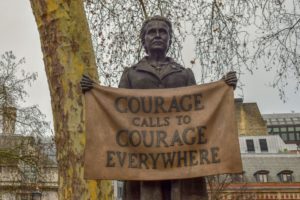
Did you know that there is no constitutional protection that explicitly prohibits discrimination on the basis of sex? That is because the Equal Rights Amendment (ERA), which was introduced in Congress nearly 100 years ago, has never been ratified. Mississippi is one of thirteen states that have failed to support this amendment. Without the necessary three-fourths of states supporting the ERA, equal rights for all citizens is still not guaranteed by the Constitution on the basis of sex.
Background of the ERA
The ERA is a lot older than many people think. In 1923 Alice Paul and Crystal Eastman, leaders in the women’s suffrage movement, wrote the Equal Rights Amendment that stated:
Equality of rights under the law shall not be denied or abridged by the United States or by any State on account of sex.
Support for the amendment blossomed in the 1960s and 1970s as the movements for women’s rights and civil rights gained traction. With overwhelming bipartisan support behind it, the ERA easily passed both the House of Representatives and Senate in the early 1970s, and it was submitted to the state legislatures for ratification.
By 1977 thirty-five of the necessary thirty-eight states had ratified the ERA. Many Mississippi groups, including the Mississippi Nurses Association, the Jackson Women’s Coalition, and the Mississippi Hairdressers and Cosmetologists were active in campaigning for the ERA in the state. But another campaign was working against them: the “STOP (Stop Taking Our Privileges) ERA,” led most notably by conservative political activist Phyllis Schlafly. Their messages centered around their support of male dominance and their distrust of the federal government. Unfortunately, STOP ERA thwarted the political momentum towards the ratification of the Equal Rights Amendment primarily by targeting policy makers in southern states. When the ERA was introduced in the Mississippi state legislature in 1973, it didn’t receive enough support to make it out of committee for a full vote.
Why is the ERA important today?
 Its language is simple, but its effect would be powerful. The Equal Rights Amendment would enshrine the equality of the sexes into our Constitution and protect the rights of not only women, but also people who are nonbinary, queer, or trans, from the whims of Congress and the states.
Its language is simple, but its effect would be powerful. The Equal Rights Amendment would enshrine the equality of the sexes into our Constitution and protect the rights of not only women, but also people who are nonbinary, queer, or trans, from the whims of Congress and the states.
Though various protections for women and LGBTQ individuals have been won legistiavely, these efforts to piecemeal protections have left gaps and loopholes, and some require ongoing Congressional support, such as the Violence Against Women Act (VAWA) which requires regular reuthorization for continued funding. A Constitutional amendment could close those gaps. Additionally, if ratified the ERA could be a critical piece of advocating for reproductive rights, health, and justice–one of the very reasons that anti-choice activists have worked so hard to organize against its ratification.
The ERA is still viable, and it’s just as vital now as it was almost a hundred years ago. The state of Nevada ratified the ERA in 2017, followed quickly by the state of Illinois in 2018. That means only one more state is needed to move the Equal Rights Amendment out of limbo. Currently efforts to ratify the ERA are active in North Carolina, Tennessee, and Florida.
What can Mississippians do to advocate for the ERA?
The key to ratifying the ERA is building awareness for it among voters and pressuring state legislators to support it. One way to keep informed on both the state and national level is to sign up for updates from organizations like the Alice Paul Institute and the Equal Means Equal project, an initiative supported by the Heroica Foundation which also produced a documentary film about the ERA called Equal Means Equal. To learn more about how to host a screening in your community, visit their website.


